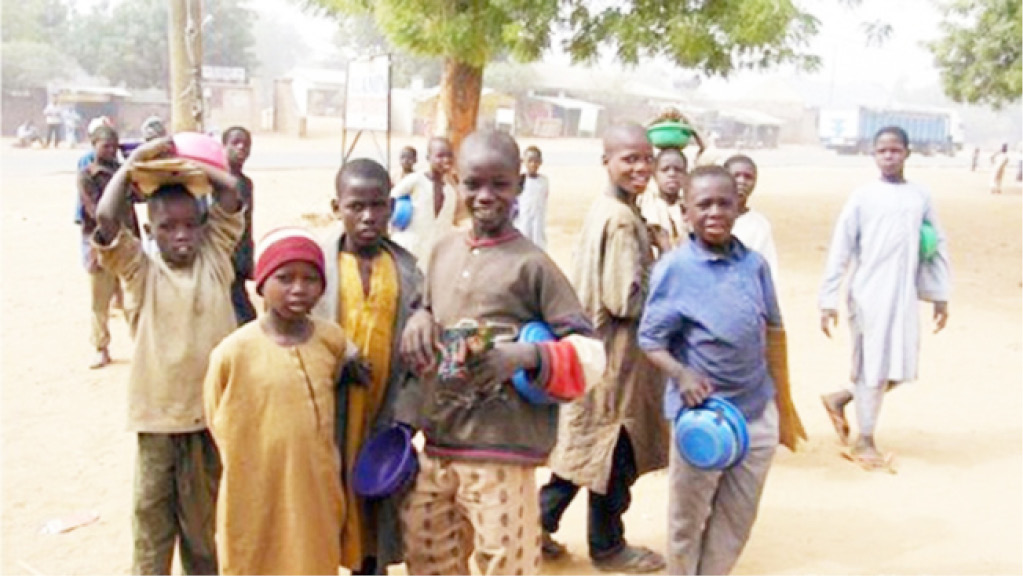What is Almajiri?
The word Almajiri was borrowed from Arabic Language which was derived from the word ‘Almuhajir’ meaning an emigrant, in this case, who migrates from his home in search of Qur’anic Knowledge.
Background history of Almajiri
During the pre-colonial era, the Almajiri Education System, originally called the Tsangaya was established under the Kanem-Borno Empire, one of the oldest ruling empires in the world extending from the frontiers of Northern Nigeria across the Chadian region up to the borders of Libya.
It was established as an organized and comprehensive system of education for learning Islamic principles, values, jurisprudence and ultimately the recitation and memorization of the glorious Qur’an which became basic Islamic learning centres in all Muslim communities.
At that time, the system was funded by the state treasury and the state Zakat funds and was under the control of the Emirs of the traditional government system that existed before the coming of the British. Since Islam encourages charity to a welfare and to a student of learning, the community as well readily supported these Almajiri whom mostly came from faraway places to enroll in the Tsangaya schools. In return, the Almajiris offered services such as laundry, cobbling, gardening, weaving, etc, as charity to the community that contributed to their well-being; hence they gave back to the society what the society gave to them as reciprocal gesture.
The Almajiri system, though funded but was not over dependent on the state.
The students were at liberty to acquire a vocational and occupational skill in between their Islamic lessons and were involved in farming, fishing, well construction, masonry, production, trade, tailoring, small business, etc. Many of them were the farmers of the Nigerian cotton and groundnut pyramids. They formed the majority of the traders in the commercial city of Kano. They were leather tanners and leather shoes and bags makers in the old Sokoto Empire.
The cap weavers and tailors in Zaria city were said to be Almajiris. Thus they formed the largest percentage of the economy of the society before the introduction of white collar jobs. After colonization, they were recruited by the British as workers and tin miners in Jos city which was then under Bauchi before the creation of Plateau State.
The system also produced the judges in Sharia Legal System, teachers, etc. They laid an elaborate system of administration in Nigeria. They provided the colonial administration with needed staff. The first set of colonial staff in Norther Nigeria was provided by the Almajiri Schools and this went on for years. In fact, the Almajiri System was a civilizing agent second to none before they were gradually replaced, phased out and indeed abandoned. Almajiri teachers also freely provided their community with Islamic education, in addition to the development of Ajami i.e. reading and writing in Arabic Alphabets. It was through Almajiri schools in Northern Nigeria that people started reading and writing. Reading and writing came to the North first before any other region. Based on this system, which was founded upon the teaching of the Qur’an and Hadiths, Northern Nigeria was largely educated with a complete way of life, governance, customs, traditional craft, trade and even mode of dressing. It is on record that Northern part of Nigeria was well organized, where people lived in walled cities, literate and devout.
Apart from being responsible for the literacy of hundreds of millions of our children over a span of ten centuries, more importantly, the Almajiri system is the only one today known in the Muslim world that has retained the reproduction of the Qur’an, written directly from memory without looking at any copy. An alaramma studiously writes the entire Qur’an, portion by portion, chapter by chapter, verse by verse, beginning with all its consonants, then he returns to add all its vowels, then its full stops and commas, dilation and nunations and so many little things that vary from page to page. He does all these without a single mistake and despite the abundant tiny differences in many verses or portions that appear similar. The counterparts of our alarammas in the Middle and Far East, people like famous Calligrapher Usman Taha of Syria who reproduced the most widely circulated Qur’an today, do so amidst luxury and comfortable environment provided for them by their governments. Yet, they can only place a copy of the Qur’an and copy from it, one word after another, not from their memory. Nigerian alaramma who reproduces it direct from memory may not even be sure of his next meal but he is never bothered since he is already used to such hardship from his early days as a Kolo or Gardi. That is how every indigenous Qur’an we come across in Maiduguri or elsewhere in Nigeria is written. The Almajiri System, therefore is a great source of good and quality educations.
The pillars of the system started falling when the British invaded Northern Nigeria and took control of the state treasury. They killed and disposed those emirs who resisted the foreign rule, while those who were subjugated lost their territories and accepted their new roles as mere traditional rulers used only for the Indirect Rule. The British also refused to recognize the Almajiri education system as an important education, arguing that they were mere religious schools.
Boko, (meaning Western education) was introduced and funded instead. Circumstantially, all the learned people who were at the helm in pre-colonial Northern Nigeria fell in one swoop and were considered illiterate or uneducated in the new status quo, making them not only unemployed but unqualified to be employed despite being able to read and write.
Islamic scholars who were reserved professionally for controlling the moral fiber of the society gradually became neglected. An Imam who may be the source of arbitration to the people of his community was relegated only to delivering sermon once a week at the local Friday Masjid (Mosque).
The same Imam is considered not qualified enough to have a say in Government or sit in the chambers of state house of assembly to deliberate on laws and constitution of the state because he was considered uneducated and illiterate. With loss of support from the government and the helpless emirs, the Almajiri system therefore suffered serious backwardness and thereby collapsed. Although there was scarcity of funds and overwhelming number of children to cater for, the system continued to flourish with the support of the immediate community.
And begging was still not a norm, instead they resorted to odd menial jobs for survival. The total disregard for the Almajiri system was responsible for the belief and conclusion by the Mallams that the western education (Boko) was Christian-European origin and therefore anti-Islamic.
It bred the fear that a child with western belief will eventually lose his Islamic identity and embrace vices that negate the values and principles of Islam such as alcoholism, fornication, semi naked dressing, partying, abandoning the sallats, fasting, etc.
Almajiri education system has gradually changed, as what we have today is totally different from the original.
Present day Almajiri
Today, on a daily basis what we see are children roaming about the streets in tattered clothes, bare footed, extremely dirty, looking malnourished with dry lips and dry faces, rashes all over their body, moving from house to house, street to street, you will find them everywhere all in the name of Almajiri. They became a burden as well as nuisance to the society.
It is really sad when you see these boys hungry in market places, car parks, restaurants, supermarkets including churches begging for food. They consume all kinds of food, fresh or stale. Their common food is known as “Gajala” which is a combination of food like tuwo da miya, rice, yam, pasta and dan wake, all in one container like fresh vomit.
These victims of neglect were also victims of exploitation, many give them leftovers out of sympathy or after exploiting them for menial jobs; many resort to wheelbarrow pushing, street taunting and so on. It is a fact that the Almajiri system has deviated from its original purpose and is currently giving Islam a bad name.
Many of them are not even from any Tsangaya. This practice is totally un-Islamic and is therefore haram. Of course, it is not the choice of the child or his fault to choose this part, but I would rather say it is the parent and the authorities that could not foresee the problem this neglect could generate.
And if left unattended to, they could be an easy target for radicalist groups to brainwash and recruit for violent, destructive and anti-social activities.
Solution
The fact that Almajiris go out begging and living in bad conditions does not mean that nothing can be done to fix the problems. Banning or abolishing is not even the solution, as we cannot afford to throw away the bathing water with the child in it. That is not acceptable. It is actually possible to revive and sanitize the system and make it work perfectly again. This, of course, cannot happen without taking the following needful steps:
First is government’s intervention;
Nigeria is a nation that values education and has embraced education for a very long time. She has committed a large chunk of her earning in pursuit of education at all levels and has adopted education as an instrument per excellence. It is therefore very critical at this moment for government at all levels to consider Almajri and provide them with opportunities and access to Basic Education Programme.
Though government alone cannot be able to achieve the desired goal without partnering with the following;
- All local authorities or traditional rulers at all levels must be fully involved and register all the Tsangaya in their localities. Funding must be adequate, regular and monitored. The school should be planned to include technical and vocational training and adult education to cater for the older members of the community.
- All the Tsangaya across the country must be identified and registered with NGOs.
- Non-Governmental Organizations like Almajiri Support Initiative (ASI) and other similar NGOs that have access to all the Tsangaya and ability to work closely with the alarammas must come together as a team, and all the existing Almajiri schools be taken over by the NGOs for proper monitoring and supervision.
This partnership can only be achieved by first signing a solid and binding agreement to form a working synergy between the following: –
- The government; Federal, State and Local Government.
- The Tsangaya in all the affected zones
- The traditional institutions at all levels
- The non-governmental organizations willing and interested in being part of the programme thrust.
Being a paper presented by Amb. AL-Amin (MDG, UPF) at the Women in Da’awah (WID) 14th Annual National Conference in Kaduna on 22nd June, 2019.

 Join Daily Trust WhatsApp Community For Quick Access To News and Happenings Around You.
Join Daily Trust WhatsApp Community For Quick Access To News and Happenings Around You.


